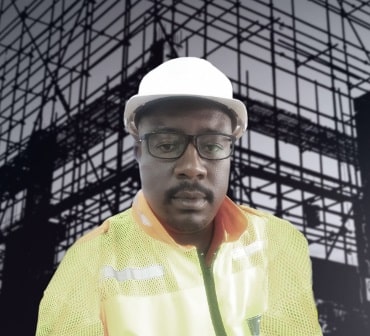Oswell Machekano’s blossoming career is evidence that just because you start in one sector of engineering, it doesn’t mean that you don’t have the chance to redirect your path into another.
One of the best things about being an engineer is that you have the opportunity to work across a plethora of industries – and just because you start in one, you always have the chance to redirect your path into another.
For Oswell Machekano, that’s meant something of an ideological U-turn, thanks to his recent switch from a role in a coal-fired power station to a new career in renewable energy.

“Being involved in this sector for the last six years has been a great journey,” he says. “I would like to continue to use my experience and knowledge to help myself and future generations tap the natural resources and have a green world with less pollution.”
As an engineering quality assurance and quality control manager for Spanish energy sector company GrupoCobra, Oswell is currently based in South Africa, where he switched from a role at a 600MW coal fired power station to his new position. His most recent projects include two concentrated solar-power projects that will be generate 100MW for the grid, and two solar photovoltaic-panel projects that will produce 75MW and 50MW respectively.
Looking to increase his understanding of the new sector into which he was moving, Oswell decided to undertake the 52859WA Graduate Certificate in Renewable Energy Technologies at the Engineering Institute of Technology, graduating in 2020 with a more advanced knowledge of the industry and how it operates.
“I chose the course because of my current work situation, and because I see my future lying in the sector,” he explains, “seeing the need to expand my theoretical knowledge and understanding of diverse renewable energy.”
Certain that continued technological development in the clean renewable energy industry will gradually render fossil-fuel pollution a thing of the past, Oswell believes more young people should pursue careers in science, technology, engineering and mathematics (the STEM subjects). By preparing a new generation to take up the baton from existing engineers, there’s a greater chance of effecting positive change.
“The world needs a lot of these specialists,” he says, “to take over and continue with such researchers to ensure our future is in a better place.”
It’s a pathway that he himself followed, having been drawn to science from an early age. “I had a love for physics from my high-school days,” he says, “and I went on to find a love for electronics and electrical engineering.” Indeed it was during an apprenticeship with tyre manufacturer Dunlop in 1998 – secured immediately after leaving school – that he learned the first elements of electronic engineering, specialising in control and instrumentation.
The work experience with Dunlop was the springboard to a successful career that has allowed Oswell to sample a broad range of the disciplines offered by engineering. Remaining with Dunlop first as a qualified instrumentation technician then as Control and Instrumentation Supervisor, he then pursued work in the mining sector. Acquiring a position in Namibia, he went on to be involved in the construction of mines and processing plants, pivoting to civil and structural engineering, and settling in the renewable energy sector.